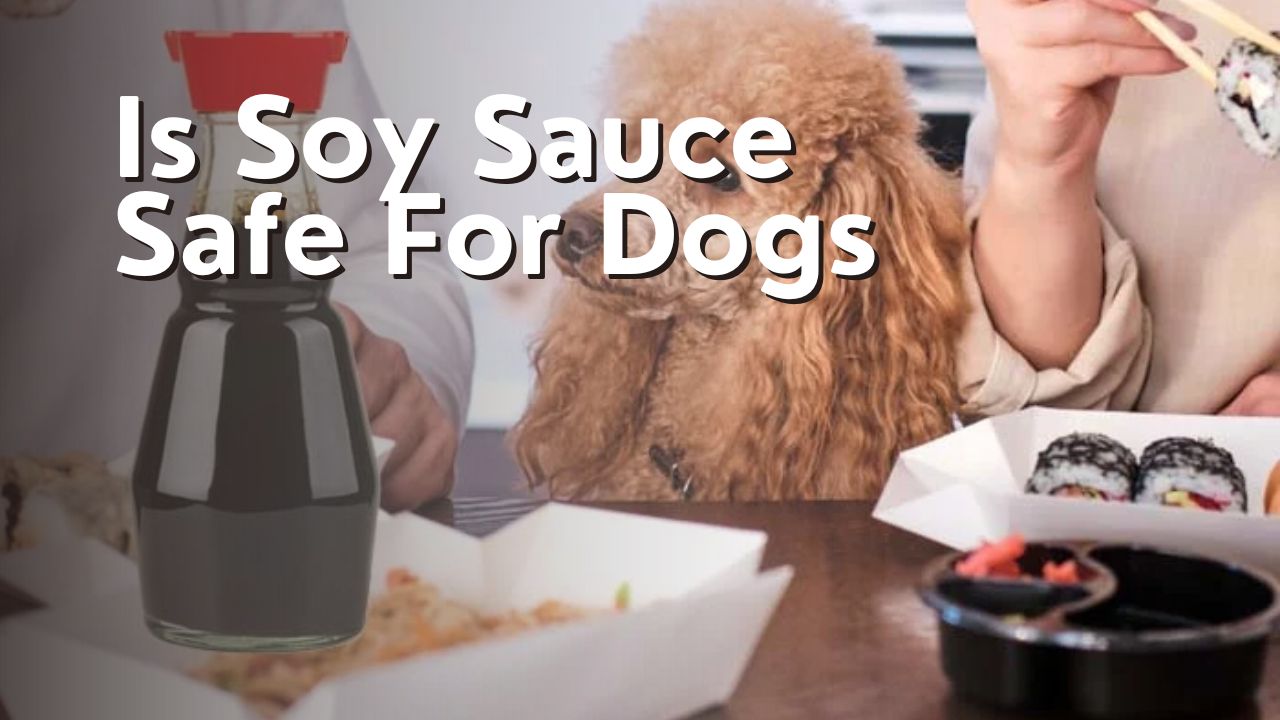I’ve always been a dog lover, and as a responsible pet owner, I’m constantly on the lookout for potential dangers to my furry friend. One question that has recently come up is whether soy sauce is safe for dogs.
This got me curious, so I decided to do some research and share my findings with you. In this article, we’ll explore the potential dangers of soy sauce for dogs and why it may not be the best seasoning option for their meals.
I’ll also provide some alternative seasoning options that are safe and healthy for your canine companion. Additionally, we’ll discuss the signs and symptoms of soy sauce toxicity in dogs and what to do if your dog accidentally consumes it.
So, let’s dive in and learn more about the importance of being mindful of what we feed our beloved furry friends.
The Potential Dangers of Soy Sauce for Dogs
Soy sauce may seem harmless, but it could pose potential dangers for our furry friends. As a dog owner, I have always been cautious about what I feed my beloved pet.
I recently discovered that soy sauce can actually be harmful to dogs if consumed in large quantities or on a regular basis.
One of the main concerns with soy sauce is its high sodium content. Dogs have a lower tolerance for sodium compared to humans, and consuming too much sodium can lead to a condition called salt poisoning. This can result in symptoms such as vomiting, diarrhea, increased thirst, excessive urination, and even seizures in severe cases.
Another issue is the presence of ingredients like garlic and onions in some soy sauce brands. Both garlic and onions contain compounds that can be toxic to dogs, causing damage to their red blood cells and potentially leading to anemia.
Furthermore, soy sauce often contains wheat, which can be problematic for dogs with allergies or sensitivities. Wheat can cause digestive issues, skin irritations, and other allergic reactions in dogs.
Considering these potential dangers, it is best to avoid giving soy sauce to dogs altogether. If you suspect your dog has ingested soy sauce or any food containing soy sauce, it is important to monitor their behavior and contact a veterinarian if any concerning symptoms arise.
Our furry friends rely on us to keep them safe and healthy, so it’s crucial to be aware of the potential dangers posed by seemingly harmless ingredients like soy sauce.

Alternative Seasoning Options for Your Dog’s Meals
When it comes to seasoning our dog’s meals, it’s important to choose options that are safe and healthy for them.
There are several alternatives to soy sauce that can add flavor to their food. Some natural herbs and spices, homemade broths and stocks, and even commercial dog-friendly seasonings can be great options to consider.
Natural Herbs and Spices
If you’re looking to add some flavor to your dog’s meals, natural herbs and spices can be a great option. They not only enhance the taste of their food but also provide some health benefits.
Here are three natural herbs and spices that are safe for dogs:
- Turmeric: This vibrant yellow spice has anti-inflammatory properties and can help with joint pain and digestion issues. Just sprinkle a small amount on your dog’s food.
- Parsley: Not only does parsley freshen your dog’s breath, but it also contains vitamins A and C, as well as antioxidants. Chop some fresh parsley and mix it into their meals.
- Ginger: Ginger is known for its ability to soothe upset stomachs and aid digestion. You can grate a small amount of fresh ginger and add it to your dog’s food.
By incorporating these natural herbs and spices into your dog’s meals, you can add some flavor while also providing potential health benefits.
Homemade Broths and Stocks
To enhance the taste of your furry friend’s meals and provide potential health benefits, why not try making homemade broths and stocks? Not only are they delicious, but they can also add moisture to your dog’s food and provide additional nutrients. Plus, making your own broths and stocks allows you to have control over the ingredients, ensuring that your dog is getting only the best. Here is a simple recipe to get you started:
| Ingredients | Instructions |
|---|---|
| Bones (chicken, beef, or fish) | 1. Place bones in a large pot. |
| Vegetables (carrots, celery, and peas) | 2. Add vegetables to the pot. |
| Water | 3. Pour enough water to cover the bones and vegetables. |
| Herbs and spices (parsley, thyme, and turmeric) | 4. Sprinkle herbs and spices over the mixture. |
| Salt and pepper (optional) | 5. Season with salt and pepper, if desired. |
Simmer the mixture for several hours, then strain and refrigerate. Your homemade broth or stock can be added to your dog’s meals for an extra burst of flavor and nutrition.
Commercial Dog-Friendly Seasonings
Looking to add some extra flavor to your pup’s meals? Try out these commercial seasonings specifically designed for your furry friend!
When it comes to commercial dog-friendly seasonings, there are plenty of options to choose from. These seasonings are specially made with your dog’s taste buds in mind, ensuring they get a delicious and safe dining experience.
One popular option is dog-friendly soy sauce. It adds a savory umami flavor to your dog’s food without any harmful ingredients. Made from fermented soybeans and water, this soy sauce is a safe and tasty choice for your pup. Just remember to use it in moderation, as too much sodium can be harmful to dogs.
So go ahead and enhance your dog’s meals with these specially formulated seasonings and watch them enjoy their food even more!
Signs and Symptoms of Soy Sauce Toxicity in Dogs
Recognizing the signs and symptoms of soy sauce toxicity in dogs can help determine if your dog has been affected. It is important to be vigilant and watch for any unusual behavior or physical changes after your dog has ingested soy sauce.
- Vomiting is one of the most common signs of soy sauce toxicity in dogs.
- Diarrhea can also occur, which if left untreated, can lead to dehydration.
- Excessive thirst is another symptom to look out for, as soy sauce can cause an increase in sodium levels, leading to dehydration.
- Weakness or lethargy may be exhibited by your dog.
- Tremors or seizures can also occur.
It is important to note that these symptoms can vary depending on the amount of soy sauce consumed and the size of your dog. If you notice any of these signs, it is crucial to seek veterinary care immediately.
Remember, prevention is the best approach, so make sure to keep soy sauce and other potentially harmful seasonings out of your dog’s reach.
What to Do If Your Dog Consumes Soy Sauce
If your furry friend manages to get a taste of that salty condiment, here’s what you should do.
- Remain calm. Panicking won’t help the situation and may even make it worse.
- Assess the amount of soy sauce your dog has ingested. If it was just a small lick or a tiny amount, there may not be a cause for immediate concern. However, if your dog consumed a large quantity, it’s important to take action.
- Contact your veterinarian. Describe the situation and the amount of soy sauce your dog consumed. They will be able to provide you with specific guidance based on your dog’s size, breed, and overall health. In some cases, they may recommend inducing vomiting to remove the soy sauce from your dog’s system. This should only be done under the guidance of a professional.
- While waiting for further instructions from your veterinarian, make sure to keep an eye on your dog for any signs of distress. Monitor their behavior, breathing, and overall condition. If you notice any unusual symptoms such as vomiting, diarrhea, or difficulty breathing, seek immediate veterinary attention.
Remember, prevention is always better than cure. Keep soy sauce and other potentially harmful condiments out of your dog’s reach to avoid any accidental ingestion.
Conclusion: The Importance of Being Mindful of What You Feed Your Dog
Being mindful of the food I give my furry companion is crucial for his overall health and well-being. It’s easy to overlook certain ingredients or assume that what is safe for me is also safe for him. However, as I learned in my research, soy sauce is not safe for dogs to consume.
If my dog were to accidentally consume soy sauce, it’s important to take immediate action. Firstly, I would contact my veterinarian for guidance. They would be able to provide specific instructions based on my dog’s health and the amount of soy sauce consumed.
Secondly, I would closely monitor my dog for any signs of distress, such as vomiting, diarrhea, or lethargy. It’s important to remember that prevention is key in keeping our dogs safe. By being mindful of what we feed them, we can ensure their well-being and avoid any potential health risks.
So, let’s always double-check before sharing any human food with our furry friends. Their health and happiness depend on it!

Frequently Asked Questions
Can I give my dog a small amount of soy sauce as a treat?
No, it is not safe to give dogs soy sauce as a treat. Soy sauce contains high levels of sodium, which can be harmful to dogs and lead to salt poisoning.
Are there any nutritional benefits of soy sauce for dogs?
There are no nutritional benefits of soy sauce for dogs. While it may be safe in small amounts, it is best to avoid giving it to them as it can be high in sodium and may cause digestive issues.
How much soy sauce is considered toxic for dogs?
Soy sauce can be toxic to dogs in large amounts. It contains high levels of sodium and can lead to sodium poisoning, which can be dangerous. It’s best to avoid giving soy sauce to dogs.
Can I use low-sodium soy sauce as a safer option for my dog?
Yes, you can use low-sodium soy sauce as a safer option for your dog. It contains less sodium, which can be harmful to dogs in large amounts. However, it is still important to use it in moderation.
Are there any long-term effects of soy sauce toxicity in dogs?
There may be long-term effects of soy sauce toxicity in dogs. It’s important to be aware of the potential risks and consult with a veterinarian if your dog has ingested soy sauce.
Conclusion
In conclusion, it’s crucial to be mindful of what we feed our dogs. Certain foods can be harmful to their health. Soy sauce is not safe for dogs and can lead to various symptoms of toxicity.
As responsible pet owners, we should opt for alternative seasoning options that are specifically designed for dogs.
It’s always better to be safe than sorry when it comes to our furry friends’ well-being. Let’s prioritize their health by making informed choices about their diet.


